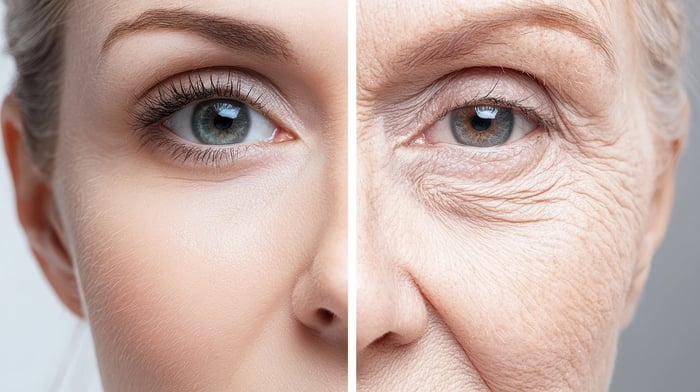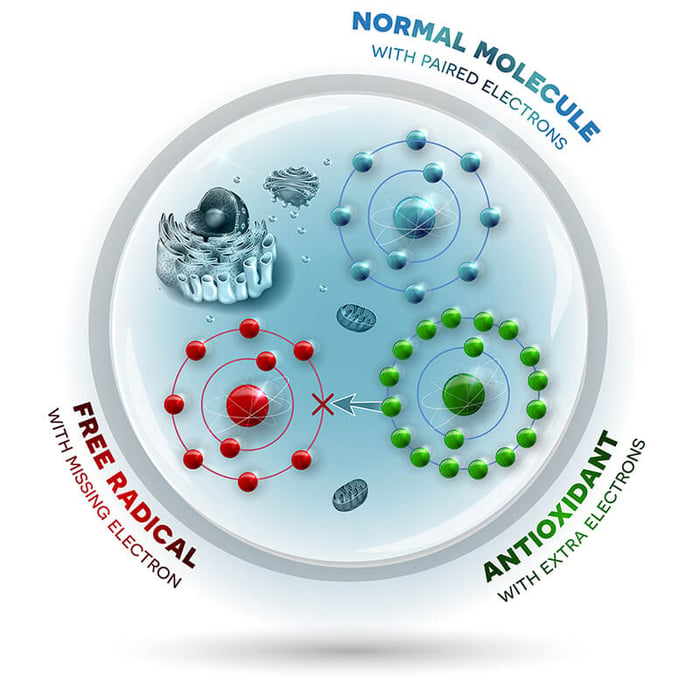You’ve heard sugar isn’t great for your health and sugar causes wrinkles- but how?
Did you know sugar can also directly impact your skin’s appearance and cause wrinkles? While we often think about sugar in terms of weight or energy crashes, there’s a lesser-known but powerful biological process called glycation that links excess sugar intake to premature skin aging and sugar can cause wrinkles.
Let’s break it down: what glycation is, how it affects your skin, and what you can do to protect your collagen and keep your glow sacred.
What Is Glycation?
Glycation is a natural chemical reaction in the body. It occurs when sugar molecules (like glucose and fructose) bind to proteins or lipids without the help of enzymes. This non-enzymatic reaction forms compounds called advanced glycation end-products (AGEs).
Once AGEs form, they trigger inflammation and oxidative stress, damaging cellular structures—including your skin’s structural proteins: collagen and elastin which can cause wrinkles
Glycation’s Impact on Skin Health and Causes Wrinkles
Collagen and elastin are responsible for your skin’s firmness, elasticity, and youthful appearance. When AGEs accumulate:
Collagen becomes stiff and brittle
Skin loses its bounce and suppleness
Wrinkles and sagging appear earlier
The skin barrier weakens
Overall radiance and clarity decline
These visible effects are what we call "inflammaging"—chronic, low-level inflammation that accelerates the aging process.
According to research published in the journal Dermato-Endocrinology (PMID: 20620757), glycation damages dermal structures and contributes significantly to the visible signs of aging.
Can Glycation Be Reversed?
Unfortunately, once AGEs are formed, the body has a limited ability to eliminate them. Prevention is key. But all hope isn’t lost—certain dietary and lifestyle practices can minimize AGE formation and protect existing collagen.
The Modern Diet and Glycation Overload
Our modern diet is loaded with high-glycemic foods, processed sugars, and refined carbohydrates—all of which spike blood glucose and accelerate glycation.
Even seemingly "healthy" sugars like agave or honey, when consumed in excess, can contribute to the same process. Over time, this internal sugar burden reflects externally in the form of dull, sagging skin and premature wrinkles.
How to Protect Your Skin From Glycation
1. Reduce Sugar and Refined Carbs
Focus on whole, low-glycemic foods like leafy greens, healthy fats, wild berries, and clean proteins. These nourish the skin without triggering rapid blood sugar spikes.
🍓 Fruit Sugar vs. Refined Sugar: Understanding the Difference
While excessive consumption of refined sugars (like those in processed foods and sugary beverages) is linked to glycation and accelerated skin aging, it's important to differentiate these from the natural sugars present in whole fruits.
Whole fruits come packed with:
Fiber: Slows down sugar absorption, preventing blood sugar spikes.
Antioxidants: Combat oxidative stress and support skin health.
Vitamins & Minerals: Essential nutrients like Vitamin C aid in collagen production.
Hydration: High water content helps maintain skin moisture.PubMed+1PubMed+1Wikipedia+4Wikipedia+4FabBeautyTips+4
These components work synergistically to provide health benefits and do not contribute to glycation in the same way refined sugars do.
🧬 Scientific Insights on Fructose and Glycation
Research indicates that fructose can participate in glycation processes. However, the context of consumption matters:
Refined Fructose: High intake of isolated fructose (e.g., high-fructose corn syrup) has been associated with increased formation of advanced glycation end products (AGEs), which can affect skin elasticity and appearance. PubMed
Fructose in Whole Fruits: When consumed as part of whole fruits, fructose is accompanied by fiber, vitamins, and antioxidants, which mitigate its potential negative effects. There's no substantial evidence linking moderate fruit consumption to harmful glycation levels.
Embrace Whole Fruits for Skin Health: Incorporating a variety of whole fruits into your diet can support skin health, providing hydration, essential nutrients, and antioxidants. The natural sugars in fruits, when consumed in moderation, are not a cause for concern regarding glycation and skin aging.
2. Support Antioxidant Defense
Antioxidants neutralize the oxidative stress caused by AGEs. Think of them as internal bodyguards for your glow.
3. Incorporate Astaxanthin Daily
Astaxanthin is one of the most powerful known antioxidants. Derived from microalgae, it’s been shown to reduce signs of skin aging, improve moisture levels, and crucially, help counteract glycation damage.
Unlike sunscreen, which blocks UV absorption (and vitamin D synthesis), astaxanthin protects your skin from within—without interfering with your body’s natural light-driven processes.
In fact, studies like Glycation and Skin Aging (PMID: 27224842) suggest that internal antioxidant support is one of the most effective ways to defend against glycation-driven collagen degradation.
Additional studies also show astaxanthin's specific benefits for skin structure:
A 2012 study in Acta Biochimica Polonica found that astaxanthin supplementation improved skin elasticity, reduced the appearance of fine lines, and protected collagen from oxidative breakdown.
Research published in Carotenoid Science (2009) showed that both oral and topical astaxanthin improved skin texture, hydration, and collagen integrity in women over 40.
4. Balance Omega Fats
Avoiding high-linoleic, oxidized seed oils (like sunflower, safflower, and canola) reduces oxidative stress and inflammation—key factors in AGE formation. At Luxe Beauty, we choose seed oil–free botanicals for precisely this reason.
5. Lifestyle Practices That Matter
Get quality sleep: Glycation increases under sleep-deprived conditions
Manage stress: Cortisol raises blood glucose levels
Move daily: Exercise helps reduce circulating glucose and supports detox pathways
How Luxe Beauty Fights Glycation
At Luxe Beauty, we believe in addressing the root cause of aging—not masking it. Our organic Glow Power Astaxanthin Serum and daily Organic Astaxanthin Supplement are designed to:
Defend against free radical damage
Reduce inflammation
Support skin firmness and hydration
Protect collagen from glycation
We also formulate without inflammatory seed oils, synthetic retinoids, or harsh actives that weaken the skin barrier.
Because your glow isn’t just about what you put on your skin. It’s also about what you feed your skin from within.
💧 How Sugar Dehydrates the Skin
Excess sugar doesn’t just damage collagen — it also dehydrates your skin from the inside out.
When you consume sugar, your body works hard to maintain balance. To process and eliminate high levels of glucose, your kidneys pull extra water from your cells — a process that leads to cellular dehydration. This fluid loss affects your entire system, including the skin.
Dehydrated skin looks:
Dull
Deflated
Crepey or thin
More prone to fine lines and rough texture
And it’s not just appearance — chronic dehydration weakens the skin’s barrier function, making it more vulnerable to environmental stress, inflammation, and trans-epidermal water loss.
Even worse? Dehydration can amplify the effects of glycation, allowing sugar-damaged collagen to show up more visibly on the surface.
🌿 The Luxe Beauty Solution:
To help protect and rehydrate your skin:
Drink filtered, mineral-rich water (especially if eating sugar)
Use hydrating skincare rich in humectants (like hyaluronic acid-in luxe lotion, anti-aging serum and the night cream) and lipid-replenishing botanicals (like raspberry and avocado oils)
Support your skin from within with antioxidants like our organic astaxanthin supplement ( internal support helps the skin cells from the inside out) and our topical antioxidant serum and the reduce glycation and retain moisture
Glowing skin starts with hydrated, supported cells.
And your glow deserves more than surface-level care.
Final Thoughts: Beauty Is a Biochemical Conversation
Glycation is one of the most overlooked contributors to premature aging. But once you understand how it works, you’re empowered to make choices that protect your glow.
Sugar may be sweet—but your skin pays the price.
✨ Ready to glow deeper? Choose nutrient-dense skincare and supplements that support your body’s wisdom.
Your glow is sacred. Honor it.
Sources:
Glycation and Skin Aging: Dietary Contributions (PMID: 27224842)
Advanced Glycation End Products and Skin Aging (PMID: 20620757)
Protective Effects of Astaxanthin on Skin Aging – Tominaga et al., Carotenoid Science, 2009
Cosmetic Benefits of Astaxanthin on Human Subjects – Tominaga et al., Acta Biochimica Polonica, 2012







